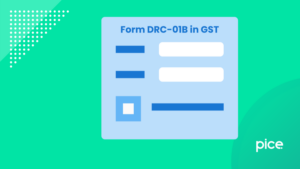Difference between Provisional and Final Registration under GST
- 30 Aug 24
- 10 mins
Difference between Provisional and Final Registration under GST
- What Does Assessment Under GST Mean?
- Provisional Registration
- Final Registration
- Cancellation of Provisional GST Registration
- What Will Happen if an Existing Person Is Required to Migrate to GST But Does Not Do So?
- Consequences and Penalties of Non-Compliance Under GST
- Transitioning From Provisional to Final GSTIN
- Legal Implications and Compliance
- Impact on Business Operations
- Conclusion
Key Takeaways
- GST Assessment: It determines a business's tax liability under various types such as self-assessment, provisional assessment, and scrutiny assessment.
- Provisional vs. Final Registration: Provisional GST registration allows 30 days of operation, but businesses must transition to final registration for full compliance.
- Provisional Assessment Rules: Requests must be in writing, and final assessment follows within six months, extendable under specific conditions.
- Penalties for Non-Compliance: Penalties for non-compliance can reach up to ₹25,000, with potential imprisonment for tax evasion.
- Business Impact: Provisional GSTIN offers temporary benefits but requires transition to permanent GSTIN for full tax benefits and compliance.
The Goods and Services Tax (GST) played a major role in making Indian businesses globally competitive. It has merged multiple indirect taxes to facilitate seamless tax calculation. Moreover, the GST Act, of 2017 has introduced some revolutionary provisions like self-assessment. In this blog, we will explore different types of GST assessment while highlighting the difference between provisional and final registration under GST. This will assist every registered taxpayer to access the necessary resources using their GSTIN.
What Does Assessment Under GST Mean?
Assessment refers to the process of determining the tax liability of an individual as per the provisions of GST law. By implementing this process, the monthly tax amount of a business or a person is evaluated.
The following list gives you an idea about the different types of GST assessment:
- Self Assessment: The process is handled by the taxpayer and comes under Section 59.
- Provisional Assessment: Tax authorities take care of this process as per the regulations listed under Section 60.
- Scrutiny Assessment: It comes within Section 61 and is executed by tax authorities.
- Best Judgement Assessment: The assessing officer makes an unbiased evaluation based on their reasoning and the available information.
- Assessment of Non-filers of Returns: This provision is described under Section 62 of the GST Act.
- Assessment of Unregistered Persons: It comes under Section 63.
- Summary Assessment: It is a fast-track evaluation based on the return filed by the assessee, completed on a priority basis without the taxpayer's presence to prevent potential revenue loss.
Provisional Registration

According to the provisional registration norm, if an assessee faces difficulties in determining the GST rate or value, they have the option to request an officer for assistance.
Generally, the difficulties arise in -
- Figuring out the transaction value
- Deciding whether certain receipts have to be considered or not
The assessee may be unsure in determining the rate of tax in cases where a new notification is involved. Similarly, difficulties may arise while classifying certain goods/services.
Provisions of Provisional Assessment
While requesting a provisional tax assessment, these rules are to be followed:
- The request must be in writing.
- Concerned officers hold the right to allow tax payments on a provisional basis. In that case, the GST rate and value are specified by them.
- A 90-day timeframe from the date of request is assured within which the order will be sanctioned.
- To ensure the payment of the variance between the provisionally assessed and final assessed GST amount, a registered taxpayer must issue a bond and provide a security.
- A provisional assessment sets the foundation for the final assessment. Thus, during the final phase, the proper officer can ask you to present additional information.
Time Limit for Final Assessments
Final assessments are executed within 6 months of the provisional assessment. The Additional/Joint Commissioner can order further extension of the deadline by 6 months. At maximum, the timeline can be extended up to 4 years if the Commissioner feels the need for it.
Interest on Additional Tax Payable and Refunds
Any taxpayer is liable to pay interest on the pending tax amount under provisional assessment if it was not settled before the due date. The day from when the GST amount was first applied to the supplies till the actual payment date is considered to be the interest period. In this regard, whether the tax amount was settled before or after the final assessment does not matter.
The interest rate will be a maximum of 18%. If the tax from the final assessment is less than the provisional assessment, the taxable person will receive a refund with interest, which will have a maximum rate of 6%.
Final Registration
Every taxpayer who has been granted provisional assessment must apply for final GST registration. To do this, they must digitally submit Form GST REG–26.
The final registration form is verified using an electronic verification code. You need to attach a few documents too along with the form as notified on the GST portal.
Besides uploading the application online, you can also visit a Facilitation Centre notified by the Commissioner to apply for final registration.
Further down the line, the concerned officer can ask you to fill up REG 06 if any of the submitted information is invalid. You can find such declarations via a show-cause notice in GST REG 27. Also, the provisional registration may get cancelled in this regard if a reasonable opportunity appears. In case your response to error-flagging is satisfactory, an order is sanctioned nullifying the show-cause notice.
Cancellation of Provisional GST Registration
If you have already registered under pre-GST norms, re-registration under GST is not necessary. Any taxpayer is given 30 days to apply for cancellation of registration. You can use the Common Portal to issue Form GST REG-29 for cancellation of registration. Once an authorised officer finishes inspecting your application, the registration gets cancelled.
What Will Happen if an Existing Person Is Required to Migrate to GST But Does Not Do So?
In this situation, the concerned taxpayer will not be allowed to claim the input tax credit of excise & VAT applicable on stock. In addition, several penalties will follow due to non-compliance under SGT.
Consequences and Penalties of Non-Compliance Under GST
As per GST rules, the following consequences may come into play if a taxpayer does not comply with the existing norms:
- Where the taxable amount is not paid and short paid, a penalty shall be 10% of the tax amount due with a minimum penalty of ₹10,000.
- Additionally, penalties may reach up to ₹25,000 if:
- Concerned individuals accept supplies with knowledge that it directly or indirectly violates the GST Act
- A person exploits GST rules to enable and facilitate fraudulent acts.
- An entity does not generate invoices abiding by the GST rules.
- The relevant body remains absent whenever summons are issued via the tax authority.
- A person fails to keep track of invoices in their book of accounts.
- Imprisonment of 1 year will be declared along with applicable penalties if the pending tax amount ranges between ₹1-2 crore.
- Imprisonment of 3 years will be declared along with applicable penalties if the pending tax amount ranges between ₹2-5 crore.
Transitioning From Provisional to Final GSTIN
Eventually, all businesses must switch from a provisional GSTIN to a permanent and regular GSTIN to run their operations smoothly. To facilitate this transition without any such obstacles, consider noting down the steps below:
Step 1: Make sure the validity of the provisional registration is still active until the permanent GSTIN is issued. The scope of provisional GSTIN is limited to only 30 days. Thus, you are required to get the regular one approved within this timeframe.
Step 2: While submitting the application for final registration, one needs to ensure all the supporting documents are up-to-date. Outdated information will unnecessarily delay the approval.
Step 3: Select whether you want to apply via online or offline channels. As online submission via the Common Portal is much more convenient, most people go for the first option. Otherwise, you can get assistance from Seva Kendras.
Step 4: Ensure to check the status of your business’ transition from provisional to permanent GST registration. If you see there is a significant delay in receiving the approval via email then do not hesitate to seek assistance from the relevant authorities.
Remember that the transitioning process is time-consuming. Thus, you need to be patient and fully aware of the compliance provisions applicable in this phase.
Legal Implications and Compliance

Following legal implications have to be there when a business is registered temporarily under GST:
Using the provision of GSTIN, the business is liable to settle transactions for 30 days. However, if any activities are noticed during the provisional registration period that do not comply with GST rules, severe penalties will be levied.
Contracts accepted by the business have to be temporary in nature. It must mention clauses that specify modifications in the GST structure after the business is permanently enrolled under GST in future.
Finally, the business will not be allowed to draw Input Tax Credit on their purchases with the provisional GSTIN. Thus, getting stuck in this phase may seriously hamper the cash flow and thus, cost-effectiveness will be a major issue.
To maintain legal compliance under GST, you must:
- Submit documents timely
- Issue accurate invoices
- Generate e-way bill
- File the GSTR-1
Impact on Business Operations
Here you can see both the positive and negative aspects that a business experiences upon the use of provisional GSTIN:
Positive Impacts
- Businesses get temporary access to some of the benefits under GST. Additionally, they can successfully avoid being levied penalties from time to time or facing issues.
- Provisional GSTIN helps reduce the compliance burden for 30 days. So, an owner is likely to face minimal restrictions while their business is in its initial stages.
- Provisional GSTIN allows people to explore new opportunities that mandatorily require registration under GST.
Negative Impacts
- Provisional GSTIN does not offer the full advantage of the Goods and Services Tax regime. Hence, management of cash flow is disrupted to a level as businesses are not able to claim ITC.
- Certain business operations may get delayed as the provisional GST is temporary in nature.
Conclusion
The provisional assessment determines tax liability when the actual amount cannot be determined at the time of supply and must be finalised within 6 months unless extended. On the other hand, provisional registration is a temporary GSTIN allowing businesses to operate like those with regular GSTINs for at least 30 days. After this period, businesses must switch to permanent registration.
Understanding the concept of assessment under GST and the difference between provisional and final registration is crucial for business owners to avoid compliance issues.
💡 If you want to pay your GST with Credit Card, then download Pice Business Payment App. Pice is the one stop app for paying all your business expenses.




















